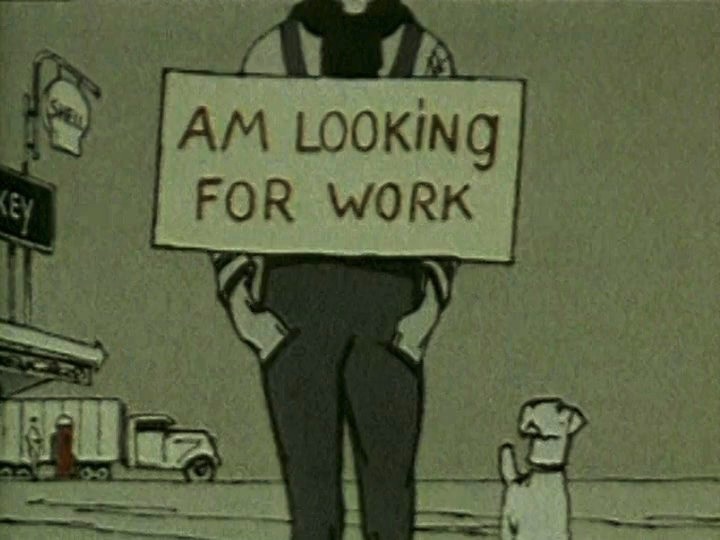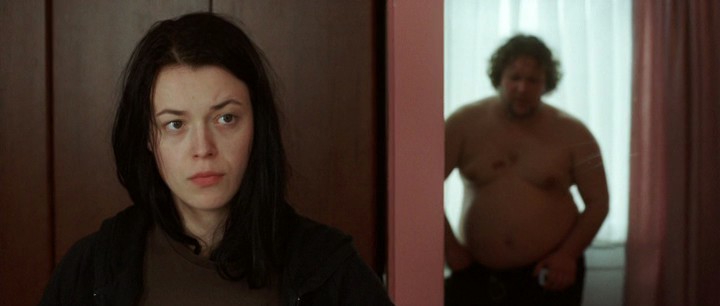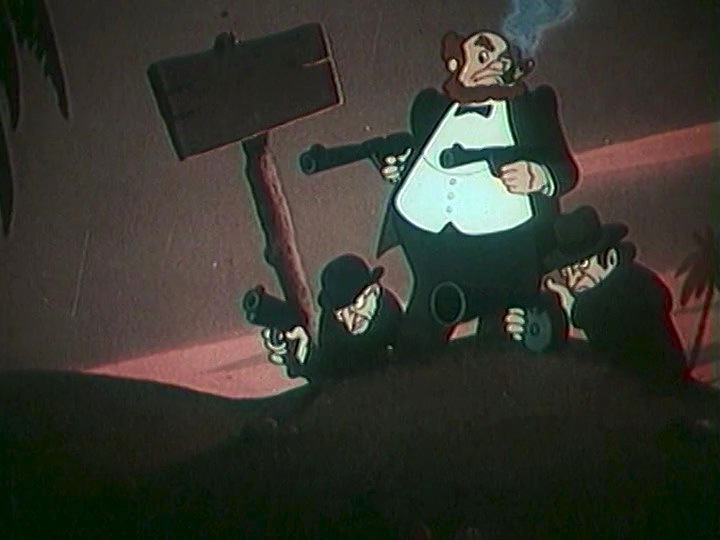Horatio Alger’s magazine moguls started as paupers and turned themselves into princes all because they could, because they were Americans and in the land of opportunity anyone can be king. Shoeshine boys and kids with brooms, often conveniently orphaned, learned and earned their ways up corporate ladders armed only with their own virtue. I wonder if Alger ever saw what his myth wrought—if he knew the remarkable debauchery The Wolf of Wall Street would demand as reward for his ill gotten gains, or if he sensed the magician con-man (a la American Hustle) is a cousin to his pristine capitalist hero. When he was writing his can-do stories, the myths of capitalist uplift were cast with people fit to canonize. He was inventing Saints. What romance! What glamor! What on earth have we done with them?
Workers Leaving the Factory (Dubai)
When mass production was new, the turn of the century was lousy with high-minded pictures about the beauty of work and the pitfalls of exploitation. The worker is the machine in Ballet Mechanique and wasn’t it Man with the Movie Camera that watched jubilant girls box cigarettes like it was a social hour? They’re more fun than machines and they do all the same work! We weren’t making movies about the grimier side yet, the exploitive bits the company brass mentions in hushed tones (and the board calls “necessary”). Ben Russell’s Workers Leaving the Factory (Dubai) begins at what looks like dawn in front of a series of high-rises under construction. Nameless and largely faceless men walk a messy path from one bus to another, invoking the memory of the Lumiere Bros. playful actuality Workers Leaving the Factory—but these workers aren’t happy like Lumieres’. There are countless men here and no sooner does one bus spit them out than another rounds a bend to reveal the next shift. These men are grist for the mill, each of them, and their numbers appear endless. The title is a nod: how things have changed.
The Shareholder
We associate personal freedom with the bison of the plains, but the bull of Wall Street is the totem for America’s capital of capital. Sleek, imposing and cartoonishly aggressive, the bull must have inspired the look of this epically engrossing twenty-three-minute Soviet cartoon. Animated with the sexy streamlines re-popularized by Mad Men, The Shareholder of the title is a proto-Don Draper, another icon of capitalist machismo. The Shareholder isn’t the cheerleader he might have been if his were an American story. In Russia, Don Draper is a working-class man, but because of a share he owns with his Arms Manufacturing mega-corporation he’s entitled to credit, and this is how “the promise of America” screws you. He uses his credit to maintain a bachelor flat and a model GF and on his big dates with the girl everyone wants he waves causally to the company big wigs—the invulnerables who’ll look away when their restructuring leaves him penniless and roaming the streets with his dog a la Umberto D. A parable about the vulnerability of the working classes and the illusiveness of monetary security, the biggest feeling you have after those massive twenty-three minutes is how utterly compelling it is—and it was a tragedy! Would you believe the illusion? Yes! Who wouldn’t?
The Gods of Times Square
In a system dependent on both imaginary and real money (but mostly imaginary) you’d think more attention would be paid to the matter of faith. Well Richard Sandler gave the matter thought and came up with two loose documentaries about the preachers who rallied in Times Square before The Mouse House bleached Manhattan’s city center into a family friendly tourist trap. Before this it was awash in prostitution and proselytizing…but it was also the block on which you could see the classes stratified a la Fritz Lang’s Metropolis. By the stars were the neon signs and behind them the glass offices of higher ups, the middle class minions were in the semi-obscured mid-section in opaque offices and the working class was on the ground, running bobble-head stands and delis. When Mickey let loose his million enchanted brooms he forced out more than the sex workers. It was the prophets with their megaphones that most intrigued Sandler—a seeker himself he asked everyone who’d talk with him about the Gods they called “right” and the sins they called Satan. They admonish him plenty—they shared an implicit economy of teases and taunts—but in the final hour, after revealing the people who truly suffered at the hands of Disney, their churchy vocalizations resemble scattered screams, sound and fury.
Slovenian Girl
Manhattan can’t be the only place where “world class” crashes into “no class” but no matter where it happens that collision creates a type of chemical combustion that runs a city more efficiently than money. It apparently runs the post-Union eastern block, and the Slovenian Girl of Damjan Kozole’s drama is quick to adapt. She looks in shop windows at the modernist furniture she could enjoy if she could only make a little more but, as a student not much is available to her. Her dad bends over backwards to help her with rent (a sweet man) and she takes it so as not to arouse suspicion. She’s been hooking her way through college for months and it’s not so bad—so far her worst situation is a hotel heart attach but that might be good for business. She’s a high-priced escort and all the diplomats who hire her call her a “nice girl”—it stings to hear. But the stakes are high and the themes are political—the Euro has eroded the value of money in her country more than intended and life in cosmopolitan Ljubljana is only so lovely as a result. Forget fearing the end of your native culture—this breath of European financial equality is mightier and its poison stealthy.
Money
One should think every nation has a different tack on the mysteries of money—like time or love it’s a figurative quality with many literal manifestations. Americans often side with the French on the romantic ideal that love should be protected from the corruption of finance. Louis Feuillade’s The Heart and Money showed a middle-class girl suffering in a marriage her mother machinated for their security. Alice Guy-Blache made a surprisingly astute equivalent for a black audience in A Fool and His Money—it was admittedly snarkier than Feullade’s. The sex/money/women connection must confuse the hell out of men, especially at a young age, which is likely why Rudy Burckhardt begins his forty-five-minute film Money with a disturbingly dangerous father-son chat in the woods. The potentially drunk, possibly backwater dad expresses only confusion, questions about the nature of money, while the rest of the film sojourns into quasi-narratives about the richest man alive and the inability of the one percent to enjoy anything but earning or hoarding. There’s no joy in this “comedy,” only cynicism, but the snake eats its own tail—we couldn’t be cynical without the money we’re blaming for our blinding lack of authenticity. What is money? Well son, sometimes it can get you laid.
The Sheik and I
To further confuse the philosophical terrain, governments sometimes give artists money to make cultural products for them. One wonders if the Middle East nation that commissioned (of all people) Caveh Zahedi to make a film about “art as a subversive act” was in on the joke—the set up suggests so much but the film undoes that expectation. Zahedi is a messiah of malfeasance and happily takes the mantle of provocateur and narcissist to reveal the consequences of representation. (What? Did you think you could just point a camera and get away with it?) When his non-profit overseer describes Zahedi’s provocations as “justification” (i.e., fuel) for acts of religious violence, his envelope pushing looks vainglorious and dangerously cavalier. It’s like he sleeps under a poster of Slim Pickens bronco-riding The Bomb. He’s a filmmaking bull hunting down his next china shop. It’s terrifying, but damn if that man’s not an icon of the American spirit.
Making It in Manhattan
Artists struggle but if there’s one place in this nation they have a chance to “make it” it’s Manhattan. Few other places have the districts full of galleries and wealthy buyers, few other places can facilitate the poverty and social climbing required for success as an artist—they may be the only broke people ever allowed to hobnob with millionaires. “Capturing the spirit” is hard but according to Chris Maybach’s documentary making a living is harder. Doing the work is a privilege his interviewees don’t take for granted and the hardships they endure to keep producing are inspiring to hear about. They work their butts off to make it to their “daily grind” and know better than to believe their success is the result of plain hard work. Those populist myths have no purchase here. Grand Dame Louis Bourgeois appears in sweet bursts to jubilantly introduce some sculptures of hers—she reminds everyone to seek joy because if you don’t no one will do it for you.
Something Ventured
California has always been part of the frontier but in the sixties, it became the “new frontier.” By the time they named “Silicon Valley” the ink on a thousand checks had already dried and the original start up geniuses were already forced into retirement. (Worth noting: geniuses are typically irascible.) What we had around the bay was a new brand of entrepreneur—Venture Capitalists—quick businessmen who bet on the vision of others and prayed they chose the fastest racehorse. Their model of moneylending revels in risk and turns the winners into celebrities. It’s a perfect marriage of fame and fortune—produced by a dream factory and built on “potential.” Real money for imaginary products…I guess in California we do things a little differently.
Mr. Wolf
As Soviet burlesques of American capitalist swine go, Mr. Wolf is pretty fanciful. Viktor Gromov’s short cartoon suggests the worst thing a man can do is break his idealist campaign promises. Wolf decides money only buys arms and in service of pacifism he moves his prissy/bitchy family to an island. Like refugees from a Gabriel Garcia Marquez, they go about labeling things, beginning with “The Tree of Peace.” When they discover oil on the island, upscale pirates from all over the world come to claim it. (Finders Keepers, Wolf’s a weeper.) But it’s OK because cunning self-made kings can reclaim their thrones—it’s not like a corporate coup prevents them from building a new fiefdom at another company—this is The Land of Opportunity ™. There’s no “end” to wealth building and more is never enough.








